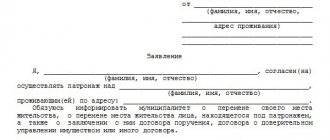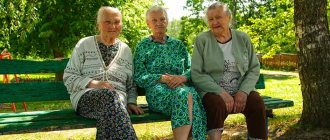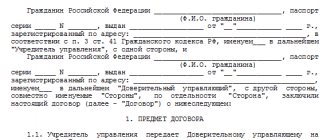Elderly citizens experiencing problems in everyday life due to old age or disability need help from third parties. The legislation provides for the possibility of a legally competent citizen registering guardianship over a representative of the older generation. Often this procedure is carried out by relatives. The person who has undertaken the obligations is endowed with rights and responsibilities. These include cooking, cleaning the house, paying bills, purchasing products and services, representing legal interests and protecting the rights of a pensioner. Given the amount of work involved, many people wonder how much they pay for guardianship of an elderly person. This will be discussed in the article.
Amount of payment for guardianship of an elderly person
As you get older, it becomes much more difficult to satisfy your needs.
Very often, patronage is the only right solution that allows caring people and relatives to take care of a pensioner.
How to formalize the relationship between an elderly person and a caregiver and how much they pay for guardianship of an elderly person - these issues are regulated by current legislation.
According to the Civil Code of the Russian Federation, assistance to a pensioner can be provided in several ways through patronage and full guardianship. The first option is not suitable if a person suffers from mental disorders.
Amount of payment for guardianship
Issues regarding guardianship of older people are considered by the Family and Civil Codes of the Russian Federation, Federal Law No. 48 on guardianship, and other regulations affecting the procedure for registering patronage.
Basically, such actions are carried out on a reimbursable basis. But the payment is not provided to all citizens; in order to receive it, you must meet certain requirements (Decree No. 343 of 2007):
- guardian's age from 18-60 years;
- you need to have your own living space;
- do not work officially;
- provide assistance to a disabled person of group 1 (a conclusion from a medical commission will be required).
An official fee for patronage is charged to all citizens who meet the listed criteria. The guardian is not required to live with his ward, but must provide him with adequate care.
The amount of the benefit is 1.2 thousand rubles. In regions where an increased coefficient is provided, the amount increases by the established indicator. For guardianship of disabled children - citizens who became incapacitated before the age of 18, the state pays 5.5 thousand rubles.
In other cases, the amount of payments is 1.2 thousand rubles. When caring for several pensioners, the amount of payments doubles. The trustee has the right to reimbursement of associated expenses.
A citizen cannot receive benefits if:
- death of a pensioner or recognition of him as missing;
- if there is a written statement from the ward that the trustee is not fulfilling his duties;
- when the guardian registers a pension or unemployment benefit;
- after the caregiver returns to work;
- if the pensioner is registered in a nursing home.
If one of the exclusion factors occurs, the ward or guardian must contact the guardianship institution. The notification period for authorized bodies is 15 days. Payments transferred with violations will be returned to the state through the court.
Calculation of benefits
The issues of establishing guardianship are dealt with by the guardianship authorities (Civil Code of the Russian Federation, Art. 35). The decision period is one month from the date of submission of all documents.
If the answer is positive, an inventory of the property belonging to the pensioner is made within 3 days (drawn up in 2 copies).
To register guardianship over an elderly person aged 80, you need to contact the authorized bodies (PFR and guardianship) at the place of permanent residence of the pensioner. The benefit is assigned if the following documents are available:
- identity cards of the citizen interested in receiving it;
- a certificate confirming the legal capacity of the trustee;
- statements from the guardian, indicating the exact date of the start of patronage;
- work book, which should not contain notes about work for a given period of time;
- a certificate from the Employment Center certifying that the caregiver does not receive unemployment benefits;
- a document from the Pension Fund of the Russian Federation at the place of registration of the guardian, confirming that the pension is not transferred to him;
- passports of the ward;
- statements from the ward with his consent to patronage;
- certificates from the medical board confirming the pensioner’s incapacity.
After registration of guardianship, the trustee is obliged to promptly pay utility bills and other obligatory payments, monitor the condition of the ward, draw up reports, and perform other duties provided for by law.
If additional profit is received, the guardian is obliged to notify the Pension Fund about this within 5 days. Otherwise, the transferred payments will be returned to the state.
Guardianship of an elderly person is a responsible matter that requires a real desire to help the person lead a normal life, regardless of what financial reward is due for such services.
How does full custody differ from social care?
Guardianship for incapacitated individuals expands the powers of the caregiver. This is because the assistant is involved in all aspects of the elderly person's life.
All funds due to the guardian are transferred to an account opened with a credit institution. In order to spend funds, it is not necessary to obtain consent from the authorities. Each year, the guardianship prepares an expense report.
Transactions with the ward's real estate are carried out exclusively within the interests of the ward after obtaining consent from the executive body.
Relations within the framework of social patronage, in turn, are regulated by an agreement concluded between the parties.
The patron's obligations include:
- execution of orders of the ward (household, representative, legal);
- notifying the elderly about the implementation of the tasks assigned to the guardian;
- transactions with real estate owned by the ward in order to obtain benefits for him.
To avoid conflict situations, care must be taken to detail the rights and responsibilities of the guardian in the contract.
Documents required to establish guardianship
Potential guardians must prepare a certain package of documents, and for candidates who are outsiders to the future ward and his relatives, it will be somewhat different.
Outside citizens will have to submit to the PLO:
- Passport.
- Medical report.
- Certificate of completion of training in guardianship courses.
- Marriage certificate (if available).
- Consent to the establishment of guardianship from all family members of the potential guardian.
- Autobiography.
- Information about income.
- Application for appointment of guardianship.
Relatives who have been living together with a potential ward for at least ten years will have to submit to the PLO:
- Passport.
- Medical report.
- Marriage certificate (if available).
- Application for appointment of guardianship.
As you can see, the list of documents required to appoint guardianship for relatives is much shorter than for strangers. But the applicant must prove his relationship with the potential ward.
OOP specialists request some documents on their own. Among them:
- information on pension payments from the Pension Fund;
- information about the presence or absence of a criminal record of the applicant;
- extract from the house register;
- information about the sanitary condition of the living space;
- a conclusion that the applicant can (or cannot) become a guardian.
What is guardianship?
Guardianship is understood as a special form of protection for certain categories of citizens. These include incapacitated persons, disabled people, and pensioners. All designated groups face problems of meeting minimal needs and self-service.
The Civil Code stipulates that guardianship can be formalized in two forms: direct and patronage. In the first case, relationships are established if elderly citizens are not aware of what is happening around them, their actions, and the consequences of their actions. To protect such people from themselves and those around them, they are assigned an assistant who takes care of everything.
Important! Since caring for the elderly is hard work physically and psychologically, a potential caregiver should evaluate their capabilities in advance.
Recognition of an elderly person as incompetent for guardianship
A person can be recognized as incapable of making independent decisions when there are sufficient reasons for this and they are compelling. The regulations for holding events are prescribed by law.
There are several reasons for an elderly citizen to be declared incompetent; several reasons are recorded in legal acts:
- age when it is not possible to move independently and take care of oneself;
- mental health disorders when there is no control over one’s own actions;
- the result of a serious illness when the patient loses the ability to control his own movements. A disturbance of consciousness occurs; the patient does not understand his own actions and the actions of others.
Today, the law stipulates three types of citizen’s incapacity:
- Age up to 18 years and after 80 years. These are two periods when a person cannot independently make legal decisions, take actions and be responsible for them.
- Mental pathology. As a result of brain dysfunction. A citizen is not able to demonstrate adequacy in reactions to the world around him. Therefore, he is declared incompetent and a guardian is appointed.
- Incomplete deprivation of rights, there are restrictions. But the actions and actions of a citizen are fully subject to the law; in case of violation, he will be held accountable.
The regulations for depriving a person of legal capacity are enshrined in article number 29 of the Civil Code. It is worth noting that only a court decision can recognize an individual as incapable of independent action. During the meeting, legal grounds and medical indications are considered. When legal criteria become the basis, it is understood that a person cannot be responsible for his actions and there is no control over them. When medical criteria form the basis of a decision, it is understood that a mental disorder does not allow a citizen to live a full life.
USEFUL INFORMATION: Inheritance of escheated property: how to register in 2021
To recognize a patient as incompetent, the following steps are taken:
- An application is submitted to the court along with a package of documents confirming the patient’s condition. This occurs either at the place of registration or at the location of the hospital;
- During the court hearing, an examination is appointed to determine the condition of the individual at the time the decision is made. If a citizen resists and refuses to undergo examination, then this is done forcibly;
- The prosecutor and the guardianship council must be present at court hearings.
After the trustee assumes his rights, he is responsible before the law for all the actions and actions of his ward.
Guardianship legislation
Guardianship involves two forms of assistance: on an ongoing basis or periodic fulfillment of obligations to care for an elderly citizen.
Guardianship involves the following actions::
- supervision and care;
- carrying out current affairs, daily assistance to the person under guardianship;
- playing the role of a legal representative when coordinating important, legally significant actions, interacting with official bodies and authorities.
Not everyone can become a guardian - there are a number of restrictions and mandatory approval from supervisory authorities. Only after receiving permission from the guardianship authorities does a person acquire a status that gives a number of powers and obligations to the state and the ward himself.
The procedure is strictly regulated and recorded in a number of legislative acts:
- general provisions of civil and family legislation (Civil Code and SK);
- Art. 32, 35 of the Civil Code of the Russian Federation, revealing the essence of guardianship and the features of the status of a person who has received the status of a guardian;
- Law No. 48-FZ, regulating the sequence of actions and conditions for obtaining status.
Download the article. 31-41 “Guardianship and Trusteeship” Civil Code of the Russian Federation (493.9 KiB, 884 hits)
Federal Law No. 48 On guardianship and trusteeship (806.5 KiB, 625 hits)
After completing the procedure, authorized employees of the government agency come to a decision on the need to establish guardianship, based on documentary evidence that the person under guardianship can no longer care for himself or herself. If the verdict is positive, a guardian is appointed within 30 days after filing the appeal.
What types of state support are required?
Caring for a disabled person requires complete dedication, as the caregiver will not have time to work. Therefore, before formalizing guardianship, you should find out what benefits are available to guardians of incapacitated people. Different disability groups of wards require slightly differentiated payments and benefits. There are also differences between the prerogatives granted to guardians of adult and child wards.
The state supports caregivers through additional payments to the ward’s pension and a system of existing benefits
Particular attention should be paid to the care of disabled people of group 1, since people in this category suffer from quite severe forms of illness, and caring for them requires more effort. Thus, the following benefits are available to guardians of group 1 disabled people:
- 50% compensation for housing and communal services.
- Sanatorium-resort treatment for disabled people and their guardians is free.
- Discount on transport tax and land tax.
- Relief from the burden of property collection.
- Labor benefits for parents raising a disabled child under 8 years old - flexible schedule, payment according to the time period worked, prohibition on business trips, overtime work.
- 50% discount for home phone.
- Preferential travel on national vehicles.
Benefits for a guardian of a group 1 disabled person from childhood include the same types of benefits as for trustees of the above category, but there is also some addition - early age pension. The reduction occurs in the proportion of a year per 1.5 guardianship. An important condition is the presence of an insurance period of 15 years for females, 20 for males. The total duration of such reduction does not exceed five years.
Benefits for guardians of group 2 disabled people include:
- discounts on utility bills;
- free social services;
- benefits when receiving education;
- discount travel on public transport.
Benefit rate
When caring for a disabled child under 18 years of age, parents are paid 10,000 rubles. If a regional coefficient is in effect in the region, then the amount of assistance can increase to 20,000 (Letter of the Ministry of Labor of the Russian Federation dated 06/09/2003 No. 1199-16). Guardians of disabled adults receive an additional payment of 1,200 rubles.
Guardians are also entitled to the following benefits:
- Reimbursement of costs for housing and communal services – 50%.
- Once a year, vacation in a sanatorium with your ward.
- Discount on payment of land tax.
- Exemption from property tax (Article 407 of the Tax Code of the Russian Federation).
- Exemption from payment of transport tax (cars up to 200 hp).
Group I disabled people are also paid a disability pension. The incapacitated person's money is usually managed by a guardian.
Non-working able-bodied persons are paid 1200 rubles monthly. Residents of the Far North receive payments taking into account the regional coefficient (1.15-2). The money is accrued along with the pension of the disabled citizen.
Subjects of the Russian Federation may provide additional types of payments to families of disabled people. For example, clause 1.4 of the Moscow PP dated 12/16/2020 No. 2260-PP.
How much pay
Guardianship is considered completely voluntary and is not paid for by the state.
When a guardian is appointed, an incapacitated citizen receives an increase in payments in the amount of 1.2 thousand rubles, which can be spent on paying for the services of a guardian.
At the same time, the caretaker can completely manage the pension of the ward, but only in his interests.
Also, the person performing supervision can count on the fact that the entire period of supervision will be included in his work experience. Also, some regions offer certain benefits: transport, tax, etc. They are often used for incapacitated citizens, but can also be used by guardians.
Please note: for a disabled child, the increase is slightly higher - 5.5 thousand rubles. Guardianship is a complex and, unfortunately, virtually unpaid occupation by the state.
Mostly, guardianship is carried out by the patient’s relatives, since this requires maximum dedication and constant stay with the incapacitated family member.
Guardianship is a complex and, unfortunately, virtually unpaid occupation by the state. Basically, guardianship is carried out by the relatives of the patient, since this requires maximum dedication and constant stay with the incapacitated family member.
Watch the video in which a specialist talks about payments to parents and guardians of disabled children:
Payment for the services of an assistant
After the relationship between the old man (old woman) and the guardian is officially established, the latter begins to act on behalf of his ward.
In addition to directly caring for the elderly, the supporter has the right to manage the pensioner’s funds. Moreover, such operations are carried out exclusively for the benefit of the ward.
The guardian bears the costs of paying for utilities, food, personal hygiene products, medications, and clothing for the elderly.
Important! Caring for someone with legal capacity deprives the assistant of the opportunity to directly receive payments. However, the patron can count on voluntary compensation for the provision of services by the ward.
Are there any benefits for guardians?
Contents (click to open)
Guardianship and trusteeship are forms of protecting the interests of citizens who are unable to take care of themselves.
This category includes:
- minors;
- incompetent;
- disabled people.
Both institutions are connected and regulated by the same regulatory framework, and as a result, an identical set of benefits. Guardians provide assistance to the ward free of charge. The law provides for cases when funds are allocated for such support. Persons applying for social benefits devote a lot of time to fulfilling guardianship obligations. As a rule, there is no time to work and earn money. If a person strives for a higher income, it is not worth applying for such a status.
Adoptive parents often try to receive benefits and compensation on the same basis as guardians. But it's not the same thing. State support is not provided for citizens who have taken full responsibility for a minor child. They receive benefits established by Russian legislation for parents. Another distinctive feature: guardianship is temporary, and the rights of the adoptive parents are unlimited.
Legal regulation
Issues related to caring for elderly loved ones, guardianship and trusteeship are regulated by many regulatory legal acts. The main ones worth highlighting are the following:
- Art. 39 of the Constitution of the Russian Federation. Guarantees social support in accordance with the age of the person in need;
- IC of Russia. Grants the elderly the right to financial support from able-bodied relatives;
- Civil Code of the Russian Federation. The conditions under which a patron is appointed are fixed;
- Federal Law of April 24, 2008 No. 48-FZ;
- RF PP dated 04.06.07 No. 343. Establishes the procedure for compensation for the activities of persons related to caring for a disabled person of group 1 or an elderly person who has celebrated his eightieth birthday
Guardianship of an elderly relative after 80 years of age
Legally unsavvy citizens often have questions about obtaining guardianship over an elderly parent or other close relatives, such as a grandparent, aunt or uncle. Is advanced age a sufficient reason to obtain guardianship?
Question
This year my mother turned 80 years old. Due to her advanced age, she needs constant care and help around the house. In addition, I doubt her mental integrity - she is forgetful, gullible, suspicious, and can easily become a victim of scammers or unscrupulous neighbors, nurses, and sellers.
How can you properly obtain custody of your mother?
Answer
Until your mother (or another relative) is recognized by the court as incompetent (or partially capable), she is not subject to transfer into guardianship. The only thing that is permissible in this case is patronage, that is, everyday help around the house, buying groceries, monitoring medication intake, accompanying you to the clinic, and so on - without the right to dispose of a person’s funds and property.
According to Russian legislation, guardianship is assigned regardless of age. The only basis for guardianship is incapacity established in court; the basis for guardianship is limited legal capacity established in court (Article 29 of the Civil Code of the Russian Federation).
USEFUL INFORMATION: Can a sister claim her brother's inheritance?
How to become a guardian for loved ones?
First of all, you need to prepare and submit a statement of claim to the court to declare a loved one incompetent, in which you set out all the circumstances indicating the inability of the elderly person to manage himself and understand the meaning of his own actions (Article 281 and Article 282 of the Code of Civil Procedure of the Russian Federation). As evidence, the claim must be accompanied by medical certificates about senile mental illness, and a petition for a forensic psychiatric examination (Article 283 of the Code of Civil Procedure of the Russian Federation), as well as documents confirming family ties or cohabitation, which gives the right to go to court.
Representatives of the Guardianship and Trusteeship Authority (on which the appointment of guardianship will depend in the future) and the prosecutor's office (who monitor compliance with the rights of citizens) must be present at the court hearing.
After the court makes a positive decision, you can begin the procedure for registering guardianship, which is set out below (Article 285 of the Code of Civil Procedure of the Russian Federation).
Benefit for disabled children
How much do disabled children get paid? They are entitled to monthly cash payments in the amount of 2,919.02 rubles. The basis for receiving benefits is the Federal Law of November 24, 1995 No. 181-FZ and the Law of the Russian Federation of May 15, 1991 No. 1244-1.
Note. The amount of EDV is valid from February 1, 2021 (indexation coefficient 1.049%).
Separately, citizens are entitled to one-time payments when adopting children. For example, in Moscow they give 6,023 rubles for the first child, 15,879 for the second.
Disabled people from childhood, groups 1 and 2 are also entitled to a tax deduction. Its size is 12,000 rubles. for parents and 6,000 rub. for guardians (Article 218 of the Tax Code of the Russian Federation).
Requirements for an heir
The person under guardianship in this situation must meet certain requirements:
- age from 18 years;
- no restrictions on legal capacity;
- citizenship of the Russian Federation.
To draw up a will, the notary will require a certain set of papers from the parties:
- This is a passport that will contain the details of the heir,
- as well as the availability of documents of legal and legal significance. For example, for an apartment.
If the ward suffers from a mental disorder, he is not able to sign the said document in accordance with the law, thereby making his will known.
As for a will, the main condition for drawing up is the free will expressed in it. It is not compiled under the influence of coercion, threat, or violence. If these facts are discovered, the rules of the Civil Code of the Russian Federation regarding the invalidity of transactions will be applied to the will.
Thus, if a person has been taken under guardianship with the right to transfer property after his death, a notary must draw up a written order about this. His participation in the transaction, that is, in the drawing up of the will, guarantees the participants (the testator and his heir) the legality of the procedure being carried out. After the death of the testator, his relatives often claim rights to the property of the deceased, often challenging the will, trying to declare it illegal
From this point of view, it is important that this document be drawn up in strict accordance with the Civil Code of the Russian Federation
- date, place of creation;
- Name;
- surname, patronymic, name of the person being cared for, his passport details in full;
- the essence is to accurately and briefly formulate the desire to transfer property from one party to another for ownership after death;
- list of transferred property;
- number of copies of the will;
- place, date of compilation;
- information about payment of state duty.
- When drawing up a document, the notary must make sure that the person transferring the property perfectly understands the legal significance of his actions and does this on a voluntary basis.
- The testator pays a fee for the provision of this service by the state. Otherwise, the certification of the will by the notary will not be considered valid.
- One copy of the document will be left with the notary, as well as the parties to the agreement. The document comes into force after the death of the testator.
When people become caregivers for an older person, they take on certain responsibilities. The same thing happens when leaving with the right to inherit property. But the pensioner has the right to change his mind and not make a will to the person who helped him.
The reason for this cannot be, for example, senile dementia, since the will is drawn up by a fully capable person. Giving an account of his actions, in this situation the pensioner will be required to draw up a new will or issue a special order to revoke it. Both actions are permitted by law, but in this situation the participation of a lawyer is also necessary.
Guardianship, as a form of social protection, is designed to provide normal living conditions for people who suffer from mental disorders, as well as patients who are unable to fully care for themselves. To obtain guardianship over a grandmother, her grandson or another person must collect a package of documents, the same applies to patronage. By analyzing these documents, guardianship representatives decide whether a person, based on his social and moral personality traits, can care for an elderly person in need of help.
Types of guardianship
For elderly citizens, the legislator has established two possible forms of guardianship. Let's look at them in more detail.
Full custody
This type of patronage is established, as a rule, over citizens who have completely or largely lost the opportunity to exercise their rights and perform corresponding responsibilities. In addition, such citizens may also lose completely or partially the ability to self-care.
Full guardianship for older citizens is established over:
- persons who, in accordance with the conclusion of a medical institution, require full and constant care;
- disabled people of group I;
- citizens who are over 80 years of age.
Patronage
Full guardianship is established over persons who, due to their state of health, are incapacitated or partially capable, and implies a wide range of powers of the guardian.
Patronage is issued over a citizen who is not able to fully use his rights and fulfill his duties , but who is fully capable.
The list of powers of the assistant is limited by the terms of the contracts concluded between him and the citizen in need of help.
Attention! In accordance with the law, patronage cannot be established over a person with mental illness, since in this case the latter’s legal capacity is in question.
Is it possible to get a preference in connection with caring for someone in need?
A person caring for an elderly person has the right to receive compensation payment. To obtain it, you need to submit a corresponding application to the Pension Fund of the Russian Federation. Compensation is assigned for each ward. It is worth noting that a patron can provide support to several people in need, for example, a married couple. At the same time, current legislation does not oblige the patron to live with the wards in the same living space.
You cannot receive compensation payments when caring for a citizen who has received two pensions. Thus, military personnel, law enforcement officers, firefighters, and employees of the Federal Penitentiary Service have the right to such deductions.
Package of papers for compensation
To receive compensation for caring for the elderly, you will need to fill out an application and collect a package of papers consisting of the following acts:
- passport;
- application of a citizen who is entrusted with the relevant responsibilities;
- petition of the elderly;
- information that the beneficiary does not have a place of employment, work book;
- a certificate from the Employment Center stating that the beneficiary has not registered as unemployed and is not receiving appropriate payments;
- passport and work document of a person who has reached retirement age;
- the conclusion of the medical commission that the person in need is truly unable to do housework or independently satisfy basic needs;
- a certificate from the university, if the patronage was issued by a student;
- a certificate from an educational institution, if the guardian is a school student. This is permitted with the consent of the parents;
- consent of the mother and father, as well as the guardianship structure located at the applicant’s place of residence (for persons under 16 years of age).
Important! Employees of the authorized body independently find out whether the ward has a second pension. In addition, the position of the chuck is carefully checked
What amount is provided to the beneficiary in the form of benefits?
The amount of payment may vary significantly depending on the region of residence of the applicant. The base value is 1.2 thousand rubles. The increase occurs due to multiplication by the regional coefficient.
A special feature of the payment is the transfer of funds through the ward. The money is provided as an addition to the pension provision of a citizen who has reached retirement age. A person must independently issue benefits to his patron. This procedure is strictly established by current legislation.
USEFUL INFORMATION: Does a great-grandson have the right to inheritance?
Deductions are made for the current month and for previous periods. The maximum accrual period for past periods is 36 months. This procedure is relevant if the ward is an elderly person over 80 years of age.
Submitting an application can be done in several ways. The beneficiary independently chooses the one that is more convenient for him. So, the appeal is made:
- through a personal visit to the Pension Fund;
- through the State Services portal;
- with the help of a trusted person. Must have a document confirming authority with a notary's mark.
The period for consideration of the application is 10 days. If the authority decides to refuse the applicant and leaves the latter without payments, then the decision can be challenged in court. The deadline for providing a reasoned refusal is 5 days. If there are shortcomings in the text of the petition, the citizen will be able to correct them within three months.
If a person who has reached retirement age and is being cared for moves to a new place, the Pension Fund of the Russian Federation stops paying. The funds are assigned again by another territorial division of the Pension Fund of the Russian Federation. Payments are received on the 1st of the next month. In this case, the department department has the right to require the guardian to submit current documentation.
What documents need to be submitted to the concerned authority?
Old people who need the services of an assistant must personally contact the executive body at their place of residence or use the services of an intermediary (you will need to issue a power of attorney).
The applicant must submit an application for the need for social protection. In addition to the application, you need to take with you a medical certificate containing information about the elderly person’s health status.
After the pensioner submits documents, the application must be submitted by the person planning to become an assistant. The package of papers also contains an outline of the agreement that will be signed by the parties. The citizen providing guardianship undergoes a medical examination by a narcologist, a psychologist and at a tuberculosis dispensary.
Certificates issued to the patron must indicate:
- absence of a person’s addiction to drugs, alcohol, mental disorders, tuberculosis;
- integrity of the patron (issued at the place of residence, work, study);
- the ability to care for others (depending on health status);
- the guardian has the right of ownership (use) of the housing (often it is the carer who lives with the ward).
Legal acts of subjects may include other requirements that must be submitted to the institution.
What forms of guardianship are provided for by law?
Current legal acts, in particular the Civil Code of Russia, provide for two forms of patronage over the elderly. The first is full guardianship, and the second is patronage. Full care and concern are established if an elderly person, due to his health, cannot understand the consequences of the decisions he makes. Often such deviations are mental in nature and are acquired with age.
Important! Before coming under the protection of a person who has expressed the corresponding desire, a citizen must be declared incompetent by a court. After receiving the decision of the authority, the E&P authorities accept the application from the candidate and appoint him as a guardian
An important factor is the complexity of patronage of a sick person. The applicant must clearly understand that he will have to do everything for the ward, for example, cook food, clean the apartment, feed the person, help him in solving legal issues, etc. Therefore, the interested person, without receiving any significant preferences, must have moral and volitional qualities and free time. For this reason, their relatives, as a rule, become patrons of the elderly.
If an elderly person has limited health capabilities, but is aware of his actions, then he remains partially capable. In such a situation, the candidate for the role of patron provides less assistance. Patronage is also approved by O&P bodies. The scope of the patron’s powers will directly depend on the reason why the citizen needs support.
Guardianship of the elderly after 80 years of age: how to apply, how much do they pay?
Citizens who are unable to care for themselves are entitled to a guardian. For acquiring status, a person receives financial assistance from the Pension Fund of the Russian Federation. It is provided in the absence of a place of employment for the patron caring for the person in need, regardless of the fact of cohabitation. In addition, the presence of a family connection between the patron and the ward is not taken into account. In this case, the person under care must belong to one of the following population groups:
- Passport.
- Pension certificate.
- Employment history.
- Certificate from the Employment Center confirming the absence of registration as unemployed and receipt of appropriate payments.
- Certificate of absence of payments from the Pension Fund of the Russian Federation.
Important! A person studying at the school can submit documentation. As a rule, this person is a relative of the ward and wants to provide the latter with all possible assistance.
However, for this, a person must reach the age of fourteen and obtain permission from the E&P authority and parents. In addition, you will need a certificate from the educational organization.
Compensation is established on the first day of the month in which the citizen applied for guardianship. However, payments cannot be made until the status is officially obtained. Deductions amount to 1.2 thousand rubles and go in the form of an increase in the pension of the ward.
The period of care is taken into account in the length of service. Thus, for each year the patron will receive 1.8 points, which will have a positive impact on his final pension income in the future. These measures are necessary because in order to fully care for a person in need, a person has to leave work.
Contributions are made throughout the entire period of care for the needy. Payments are terminated due to cancellation of status voluntarily or involuntarily, as well as under the following circumstances:
- death or unknown disappearance of one of the parties;
- termination of deductions;
- apparatus employed;
- assignment of social benefits to the patron;
- placement of an elderly person in a social service institution;
- removal of disability (group adjustment).
How can the ward's funds be spent?
After registration of guardianship, the patron can not only resolve issues directly related to the elderly, but also spend the latter’s funds. Pension payments and benefits can only be spent taking into account the needs of the ward, for example:
- payment for housing and communal services;
- purchasing food;
- purchasing medicines;
- purchasing hygiene items;
- providing the person under care with clothing
- etc.
For patronage that does not imply deprivation of a citizen's legal capacity, as well as standard guardianship, no payments are provided. However, by agreement with the ward who is of sound mind, the latter can pay for the services of a legal representative on his own.
For what reasons can benefits be deprived?
As a rule, the termination of the transfer of funds is made upon the personal request of one of the parties. For this to happen, certain circumstances must arise. These include:
- death of a patron or ward;
- placement of the recipient at work;
- registration of a pension by the curator;
- registration with the Labor Center as an unemployed person.
The interested party is obliged to indicate the above situations within five days from the moment they occur. According to the law, this can be done both by the parties between whom the relationship has been established and by social services.
Question:
Is the patron deprived of payments if he does not fulfill his duties?
Answer:
Yes, the procedure is carried out at the request of the guardianship and trusteeship authorities. The structure sends a complaint to the Pension Fund, which stops contributions. The action is carried out from the month following the month in which the patron committed a crime against the ward, illegally used his funds (property) or stopped caring for the needy.
Conditions for obtaining social protection
The Civil Code of the Russian Federation regulates the rules observed when establishing social protection over people of respectable age:
- the person seeking outside assistance is not mentally ill (since patronage for mental defects is allowed only as full-fledged guardianship);
- the presence of consent of the potential ward and the candidate for his patrons (assistants);
- Social security workers who help the elderly at home should not become accomplices;
- Relatives and complete strangers have the right to become accomplices (most often close relatives are appointed as such),
- Various types of agreements are concluded between accomplices and an elderly person:
- agency agreements;
- assignment;
- trust property management.
The status of social contributors is based precisely on the content of such a document. Guardianship of those disabled due to illness is also formalized in the form of social protection, if such disability did not arise due to mental defects.
Underwater rocks
When arranging guardianship for an elderly person, you need to consider the following nuances:
- Government Decree No. 278 of February 27, 2021 simplified the method of submitting a document. Consent from the ward can be submitted to the Pension Fund by the caregiver directly, along with the rest of the paperwork.
- If a disabled citizen moves, the payment will be assigned to the new place. To do this, it is enough to confirm your consent by phone. Employees can additionally check the citizen’s data. There is no need to provide a certificate of relocation to the Pension Fund.
- When government employees find out that incorrect or untimely information was provided, and payments were received illegally, the blame lies with the person providing care. He will need to return the funds, regardless of the fact that they were transferred to the ward’s account.










